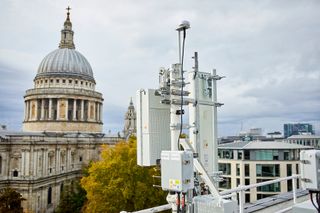EE to launch 5G as 'premium' mobile experience in 16 UK cities in 2019
Operator to upgrade 1,500 sites in the busiest parts of its network.

EE is to upgrade 1,500 sites to 5G in 16 cities across the UK in 2019, pitching the network as a premium service for mobile customers in the busiest parts of the country.
The BT-owned operator, which was the first in the UK to launch 4G in 2012, has repeatedly stated its ambition to be the first with 5G.
But whereas it viewed 4G as a replacement for 3G, it sees 5G as complementary to other network technologies.
- What is 5G? Everything you need to know
EE 5G launch
The BT Group as a whole is pushing a vision of a converged network comprising fixed, mobile and wireless elements. The idea is that customers are constantly connected and don’t have to worry about which access technology is providing the connectivity.
To this end, EE will roll out 5G at the busiest sites in the busiest cities in its network. The first six locations will be Belfast, Birmingham, Cardiff, Edinburgh, London and Manchester, with another ten locations set to follow.
EE CEO Marc Allera said there would an additional charge for 5G, believing that power users who ned a high speed, constant connection would be among the first users.
“5G in 2019 will not be about autonomous cars, and automated factories,” he elaborated. “5G in 2019 will be about delivering the best mobile experience you’ve ever had and getting the best speeds and connections. We believe customers will pay a little more for the 5G experience.”
Are you a pro? Subscribe to our newsletter
Sign up to the TechRadar Pro newsletter to get all the top news, opinion, features and guidance your business needs to succeed!
“These 1,500 sites, which is 10 per cent of our site portfolio, will serve 25 per cent of our customers. One site at Waterloo station carries more than 100TB of data per day. We’ve picked these sites based on where customers need it.”
“We believe this is the industry’s most ambitious strategy for 5G.
“We’d like to be first because as the market leader with a brand based on bringing things to customers first – we have a history of innovation – we’d love to be first and will do everything we can.”

5G Adoption
EE and BT will also offer business services, adding that more than 80 companies -including broadcasters, banks and manufacturers - had come to visit its trial in Canary Wharf to see how 5G can aid their organisations, while it will also offer Fixed Wireless Access (FWA) broadband.
However, Allera acknowledged the marketing challenges ahead. With 4G and 5G seen as complementary technologies, it will be difficult to emphasise the latter without diminishing the value of the former.
He was keen to stress that 4G is the foundational layer for 5G and therefore it will continue to invest in its LTE infrastructure.
“5G will not replace 4G and that’s a clear message,” he said. “We haven’t stopped investing in 4G: We’re upgrading and will continue to upgrade sites.
“Rural areas need more rural coverage not capacity and we’ve added more sites to give villages and roads a data service for the first time.”
Marketing challenge
EE hasn’t given a launch date beyond the vague promise of 2019, but its clear that this will be tied to the availability of compatible handsets. However, with EE continuing to invest in its 4G network to improve service, and with “killers” consumer and business applications still some time from becoming a reality, adoption could be limited in 2019.
“With any technology there are always early adopters who want to be there first,” Allera responded to a question from TechRadar Pro about EE’s early target market. “We won’t have 90 per cent 5G coverage to begin with and there won’t be a wide range of smartphones from every vendor. Our belief is that 5G will offer a faster, better service.
“That doesn’t point to mass adoption, but coverage will roll out rapidly and once you get the biggest brand names offering more smartphones and tablets, the cost will come down.
“I’ve seen a lot [of devices] already and there are going to be a lot of options in the first year. I think the best way to market 5G is to show how customers will experience it.
“The device roadmap will become clearer over the coming days and weeks and we’ll offer a more comprehensive launch date when the devices become available.”
- Here are the best mobile phone deals for November 2018
Steve McCaskill is TechRadar Pro's resident mobile industry expert, covering all aspects of the UK and global news, from operators to service providers and everything in between. He is a former editor of Silicon UK and journalist with over a decade's experience in the technology industry, writing about technology, in particular, telecoms, mobile and sports tech, sports, video games and media.
